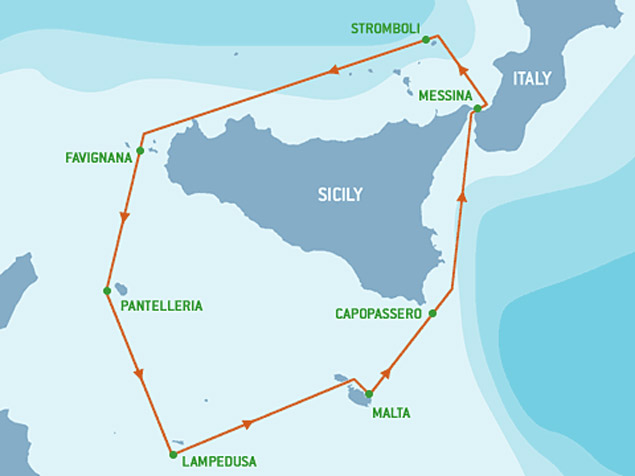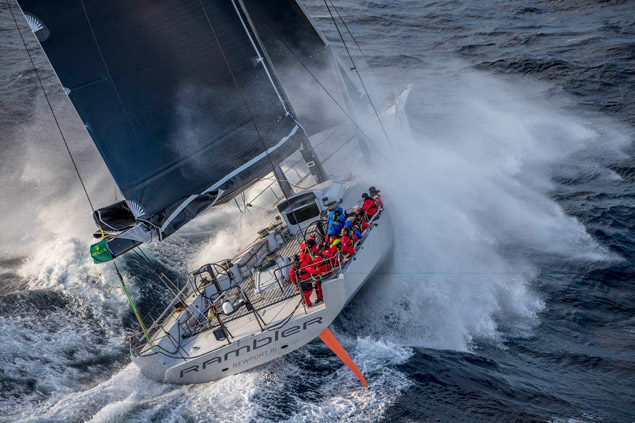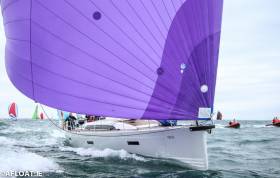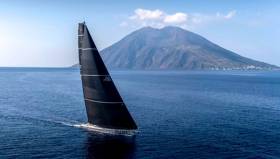Displaying items by tag: Conor Doyle
Conor Doyle of Kinsale is Sailor of the Month (Offshore) for October
While the IRC may still be the rating system of choice in northwest Europe, any movement of the action in any international direction quickly finds your boat and crew are soon into hotly competitive offshore racing events where the ORC gets equal ranking.
This was the case for Conor Doyle of Kinsale and his large crew of all the talents when they arrived with his elegant X-50 Freya to be the only Irish entrant for the Middle Sea Race 2022 from Malta.
But it’s now a double-system setup which they embrace with enthusiasm, as Freya won ORC 3 - a popular success for a highly-regarded and enthusiastic owner-skipper.
Conor Doyle’s Xp50 Freya Stays Fourth in IRC Four With 130 Miles to Middle Sea Race Finish
At the Pantelleria transit in the Rolex Middle Sea Race, Philippe Frantz’s NMD 43 Albator (FRA) held a seven-hour advantage over, currently, second-placed Esentia (POL), the Grand Soleil 44 entered by Marcin Sutkowski.
Conor Doyle’s Xp50 Freya (IRL) is in third on the water (and fourth in IRC four division) abeam of Pantelleria, while the Podesta’s Farr 45 Elusive 2, for so long leading the class on time correction, has just reached the isolated island.
Light winds have seen 50 of the 118 competing yachts in this year’s 606-mile offshore retire.
The situation in this class will become clearer once both are through the transit. IRC 4 yachts stretch back to San Vito Lo Capo, where Maks Vrecko’s Elan 450 Karpo (SLO) is last boat on the water in class.
With 131 miles left to sail, the Kinsale yacht – the sole Irish entry in the race – is expected to finish on Friday teatime after a six-day race
Overall the race has been won by France's Eric de Turckheim's French NMYD 54, Teasing Machine, with an Irish highlight of this edition being Tom McWilliam's line honours win as part of Chris Sherlock's Leopard 3 crew.
Live tracker below
In a warm-up for October's Middle Sea Race, in which Cork yacht Freya is the only Irish entry, the Kinsale Yacht Club XP50 skippered by Conor Doyle took fifth overall on IRC and ninth in line honours in this week's Palermo to Montecarlo Race.
Following line honours and second overall in June's Dun Laoghaire to Dingle Race, Doyle has shifted his campaign to the Mediterranean with a top-rated crew, as Afloat reported earlier here.
The Palermo to Montecarlo Race is organised by Circolo Della Vela Sicilia, in partnership with Yacht Club de Monaco and Yacht Club Costa Smeralda; it’s become a major event on the calendar since its launch in 2005.
This year it again attracted some of the Med's leading Maxis in an international fleet of 56 boats.
Last Monday night, after 59 hours 3 minutes 8 seconds that Guido Miani from the Yacht Club de Monaco associated with Furio Benussi crossed the finish first in elapsed time to take line honours of the 16th Palermo-Montecarlo on Arca SGR. It is his fourth title on this Mediterranean classic, having won it twice in corrected time (2007 and 2008) and elapsed time (2013).
Behind Benussi, it was a nail-biting battle for 2nd place between Pendragon VI and Aragon, won by Laurie Davidson 69 Pendragon VI over the last few metres.
With the leading Fastnet Race multihulls well round the Fastnet Rock this morning (fleet leader Gitana 17, the Ultime 32 aka Maxi Edmond de Rothschild, was first at the turn at 0633 BST) the bulk of the fleet are still struggling with calms and flukey headwinds in that tricky area off the southwest of England between the Lizard and Start Point writes W M Nixon
As the faster big boats have found - for not all the big boats have been fast - once you get past the Lizard, you begin to feel the benefit of an Atlantic southwest breeze, and though Gitana (as we apparently now have to call her) faced a few minutes of stoppage with her closest rival Macif in a freak calm calm patch northwest of the Isles of Scilly in the small hours, generally for the passage across the Celtic Sea they were looking at speeds at the top end of the 20-30 knot mark, and the Fastnet was ticked off more or less on schedule.
They are already well on their way to Plymouth, with Macif grabbing the lead around 0800 hrs. However, for the smaller multi-hulls and the enormous fleet of mono-hulls, only their leaders have got through the invisible barrier south of the Lizard.
But now some well-known names are beginning to come clearly to the fore past the Isle of Scilly as they strike out across the Celtic Sea on track for The Rock, with George David’s Rambler 88 looking set to take over the line honours lead from Seng Huang Lee’s 100ft Scallywag from Hong Kong, a boat with a storied past – apparently at least some bits of her were once in one of legendary Australian Syd Fischer’s Ragamuffins.
However, at the moment the real story in the big mono-hull line honours battle is the excellent showing of David & Peter Askew’s Volvo Open 70 Wizard from America. She’s noted as a star performer on the west side of the Atlantic skippered by Charlie Enright, she won the Transatlantic Race in July, and now she has come as cleanly as possible through the slough of despond which is the current state of the sea areas south of Falmouth and Plymouth, and she’s right there on Rambler 88’s tail, third for line honours and currently leading IRC Overall.
Meanwhile back in the crowd which is still moving slowly while often turning to windward off the south coasts of Cornwall and Devon, with 390 boats under IRC rating and all placings up-dated by YellowBrick ever quarter of an hour, the continually-changing placings inevitably mean that many boats are going to have their Andy Warhol 15 Minutes of Fame.
One such was Conor Doyle’s handsome Xp 50 Freya from Kinsale (her crew including Olympic campaigner James Espey) which was in the limelight as overall leader at one stage of Class IRC 1A. She has currently slipped back to 11th OA in Class 1A but is in contention.
However, in Class 1 and 1A and indeed the fleet generally, the best Irish hope lies with Kenneth Rumball and Barry Hurley on the Swedish-owned Ker 40 Keronimo – they currently lie 19th overall in IRC, fifth in IRC1 and fourth in IRC1A, and while still to the southeast of the Lizard, they’re well placed and making steady progress in the spreading sou’west breeze.
Astern, however, the fleet is so tight-packed and struggling to make headway that scrolling back on the tracker is a bit like looking into a can of worms, but hopefully, by this afternoon they’ll all feeling a firmer workable breeze, and a leading wind from Land’s End to the Fastnet.
Yet it’s beginning to look like a big boat race. The sou’wester will freshen out in the Celtic Sea this afternoon to speed the leaders to the rock and back again, but then after the freshening has gone through, the expectation is of veering which may even provide some of the tailenders with a beat to the Fastnet.
Race Tracker & Leaderboard here
Middle Sea Race: Hugo Boss Makes Superb Work of Tricky Conditions, Rambler Recovers From Being Stuck at Stromboli
Everyone going into the 608-mile Rolex Middle Sea Race knows they will experience a challenging course with weather which can be anything and everything from extended calms to surprisingly vicious gales, and the 2017 edition is no exception writes W M Nixon
In mostly light easterly winds after the start on Saturday, the fleet’s stately progress saw George David’s Rambler 88 give a master-class in taking full advantage of every new if small improvement in wind strength, and she lengthened away from the likes of the 100ft Leopard and the 98ft CQS in impressive style, only to see it evaporate again as she was invariably the first one into the next belt of calm.
However, she was always in the lead, and was on the up and up approaching Stromboli yesterday, only to find things very flat beyond that splendid turning point. Increasing desperate to find breeze anywhere, and always looking to be first into the much-forecast strong to gale west to norwest wind which was expected last night, she crawled along at barely a knot and ended out somewhere about nor’nor’east of Stromboli, taking a very wide turn before she began to feel the first of a new air. This eventually became the breeze which gave her a long tack/short tack beat to the next turn at the island of Favignana west of Sicily’s most westerly headland.
 The 608-mile Rolex Middle Sea Race has a bit of everything – and sometimes a lot of wind. Rambler is now on the Pantelleria-Lampedusa stage, tearing along at up to 26 knots in a mighty west to northwest wind.
The 608-mile Rolex Middle Sea Race has a bit of everything – and sometimes a lot of wind. Rambler is now on the Pantelleria-Lampedusa stage, tearing along at up to 26 knots in a mighty west to northwest wind.
It was the IMOCA 60 Hugo Boss (Alex Thompson & Nin O’Leary) which went most determinedly to the northwest. They’d actually arrived at Stromboli at a time when a neat rounding had become possible, but knowing their very special boat’s notable lack of enthusiasm for tacking duels and windward work generally, they slugged on for many miles on port tack until they could hope to lay Favignana without having to tack again.
It was a tactic which worked a treat, and now while the bulk of the fleet are still bashing it out in rugged weather north of Sicily, Hugo Boss is screaming along at 24 knots and more from Favignana towards the next turn at Pantellaria, third on the water to Leopard which is slower at 22 knots, while Rambler is already past Pantellaria and making 26 knots for Lampedusa, the final turn before the finish at Valetta.
The speeds being achieved by the three leaders could well invert the leaderboard’s former emphasis in smaller craft, which still have an awful lot of hard sailing to Favignana before they can let rip. Otra Vez (Brian Flahive & Sean Arrigo) had been well placed in the two-handed division, but now seems to signal retirement, however Xp-ACT with Barry Hurley and Shane Diviney in her crew is well-placed for the Favignana rounding, while Conor Doyle’s chartered Hydra has also made good progress along Sicily’s north coast.
But having seen small boats dominate the top placings early on, we now have the fascinating prospect of the three leading biggies carrying the strong favourable winds all the way to the finish at enormous speeds, and turning the results upside down.
 Here we go……Rambler starts to free off as she weathers Favignana at eight o’clock this morning. Photo: Kurt Arrigo
Here we go……Rambler starts to free off as she weathers Favignana at eight o’clock this morning. Photo: Kurt Arrigo
Tracker here

























































